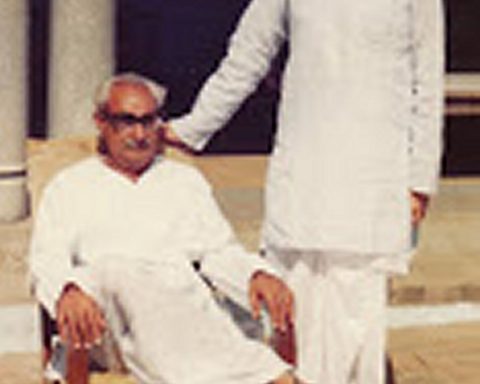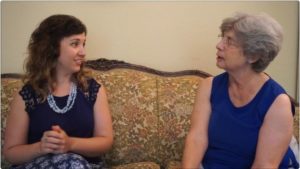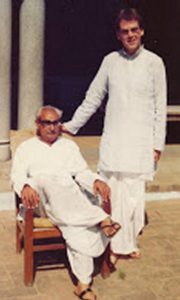Zeitreise: Living in Berlin as an English Teacher in the 90s

What was life like in post-wall Berlin for an English teacher from abroad, in a time before the internet and social media? How have things changed since then? Does British politeness go with Berliner Schnauze? Paul has the answers.
It’s a crisp winter evening, and I’m meeting Paul Hewitson at Café Bleibtreu near Savignyplatz, where he hosts his weekly English Stammtisch. He’s a bubbly, cheerful guy in his 60s. When I asked him for an interview about the old Berlin for the history section, he immediately said yes. Actually, what he said was, “Old? I can do old!”
So we take a dive back in time, as he paints a picture in front of my eyes. How he came to Berlin with his wife in 1990, just one year after the wall came down. That he stayed for two years, living in the East, but working in both parts of the city, mainly near Ku’damm. About his students from East Berlin, who were incredibly sociable and great writers – but terrible at pronunciation, due to a lack of exposure to British radio and television.
And how things had changed when he came back after spending 14 years in other parts of Germany and abroad. He winks, “Es war alles besser damals!” That’s such a German thing to say! His mischievous smile tells me that he doesn’t mean it, though. But it’s safe to assume that life was way different back in the 1990s.
Steady jobs instead of freelancing
For one thing, freelancing was considered the exception. Working as a teacher normally meant full-time employment, so that 80 per cent of English trainers held steady jobs at companies. That did not rule out flexibility, though. While working for Linguarama, Paul took his job with him from Düsseldorf to Stuttgart before settling down in Berlin.
He still rhapsodises about this, and I can see why. The job came with the opportunity to teach at fancy summer schools in England every year, all expenses paid for by the company, followed by rooftop dinner parties at Christmas time. The nostalgia is palpable as he wallows in memories of custom-tailored one-to-one lessons and gourmet buffets in Stratford-upon-Avon.
Meeting fellow teachers and other expats
But now, on one of the bigger questions of our time: was there social life before social media? The answer is: Yes, definitely! There was just no tweeting about it. Rather, English trainers would meet up casually after work and gather in groups to go to pubs and restaurants together. Companies actively promoted this, so that there was an established culture of after-work-socialising among teachers.
To liven things up, there was another group of expats, namely gasworkers from Northern England who had been invited by the German government to harmonise the gas systems between the East and the West. After work, they would go to Irish pubs. Maybe to meet teachers and brush up their language skills, but more probably to watch footy on telly and have a pint or two.
It would have been funny if there had been a Berlin Association of English Teachers and Gasworkers. Only that the gasworkers were done working at some point and headed back home.
Much if not all of the above had changed when Paul returned to Berlin in 2006. This time, he came without work and soon realised that full-time employment had given way to freelancing. Thus, job security had not only vanished, but taken with it the old social networks as well.
Finding ELTABB
Luckily, Paul found ELTABB and became a member. “That was a smart move! I didn’t know then how smart it was,” he laughs. He got his first job by word-of-mouth recommendation from another member, doing level tests of English on the phone for a small company. Gradually, more freelance work followed. After some time, he was put in touch with the manager of a major oil company in Schwedt. Being then hired as an in-house trainer for two full days a week turned out to be a stroke of luck, and he hasn’t looked back.
One thing Paul highlights is that his success was a two-way street. He’s always been very happy to be able to return the favours he received and support his colleagues as well. Having been part of ELTABB for twelve years now, he especially likes the regular social events and, in recent years, the increasingly younger average age of the members.
What about Berliners?
Finally, I ask him what he thinks about living in Berlin – a place that is full of notoriously grumpy Berliners. Funnily, he has never had reason to complain about the locals. That’s because he appreciates their directness. Like the taxi driver he described his destination to because he did not know the exact address. The man interrupted his empurpled soliloquy mid-sentence, muttering, “You wanna talk or you wanna go?”
Or the woman in the line at the post office replying to the lady in front of her, who had just apologised for stepping on her foot, “I still have another one.”
There is only one thing that bothers him about Berlin, he says. “The inability to queue! If I ever get into an argument, it’ll be because of queuing!”
Paul has been teaching and travelling across three continents over the last 30 years. He loves a good story and always has one more to tell, just in case you thought you’d heard them all. You can read an interview with Paul as ELTABBer of the month here.
Find more stories from yesteryear with one of ELTABB’s first members here.






